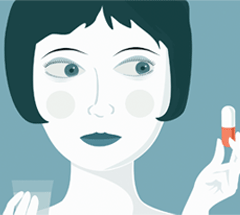Pre-baby blues
As if pregnancy isn’t enough of a challenge, getting lost […]
As if pregnancy isn’t enough of a challenge, getting lost in a gray fog of depression can really make life as a mommy-to-be difficult—and dangerous. Here’s the scoop on how to identify and overcome the pre-baby blues.

What is it?
For many mommies-to-be, the signs of depression are very similar to common pregnancy ills—hormonal shifts can lead to depression-like symptoms such as appetite changes and irritability. However, unlike a momentary bout of moodiness, depression is a sensation that lingers and interferes with your day-to-day activities.
Depression during pregnancy, or “antepartum depression,” is a very real—and sometimes very serious—medical condition that not only puts a damper on your mental state, but can have harsh repercussions for your body and baby as well. It’s important to seek help in order to keep yourself and your little one safe and make sure your future life as a mom remains happily focused on bonding with your growing family.
Antepartum depression can lead to a variety of complications.
- Preeclampsia (or high blood pressure during pregnancy) can increase the likelihood of premature birth.
- Unhealthy eating habits might result in unadvised weight gain or loss for you and nutrient deprivation for your growing baby.
- Fatal coping mechanisms may lead to substance abuse or thoughts of suicide.
Why me?
First off, it’s not just you. According to the March of Dimes, one out of every five women exhibits signs of depression during pregnancy, so when we say, “You’re not alone,” we really mean it. You shouldn’t feel embarrassed to talk to a professional about coping with depression—in fact, you’ll be glad when you do! There’s no reason to let negative feelings run your life, especially when they can also harm your budding baby.
If you’re single, having a difficult pregnancy, or experiencing stresses beyond your control, such as death, illness or unemployment, then you’re at an elevated risk for depression-related problems.
How can I cope?
While you may feel completely helpless in your battle against prenatal depression, the truth is that there are many resources to help you cope with and overcome the illness. Of course, the best way to nip depression in the bud is to talk to your doctor—let her know how you’re feeling and discuss all of your options, including medication and professional therapy. While your medical provider will undoubtedly help you immensely, part of beating depression is entirely up to you. Once you’ve sought help, it’s important to find ways to make the stresses in your life and relationships manageable.
Here are a few blues busters to help you better handle stress:
Get plenty of sleep. Getting enough shut-eye will help clear your mind and leave you feeling refreshed. You’re also better able to take on challenges and sensibly cope with tough situations when you’re well-rested.
Leave your house. Don’t lock yourself indoors. Regularly taking in fresh air and looking at something other than your own four walls can work wonders.
Talk. A good rule of thumb is to seek advice from a professional and support from friends and family. Sometimes just having a shoulder to cry on is a lifesaver.
Build relationships. Whether a rift previously existed between you and your partner or your depression has caused a little distance, rekindling your flame will be an immense relief to both of you. Whether you need to schedule a routine date night or seek couple’s counseling, now is the time to put your relationship at the forefront—the arrival of a baby won’t fix a damaged duo.
Love yourself. Make time to focus on you. Take longer showers, keep a journal, and stay healthy. Caring for yourself will make you feel better, and it’ll also make you a better mom.
Will this lead to postpartum depression?
If you start taking care of yourself now, you may be able to skip over the issues associated with postpartum depression later. Postpartum depression can interfere with a mother’s ability to take care of herself and her baby, and for many it can build a barrier that prevents proper bonding. Getting professional help early on can tear down this wall and allow you to live a healthy, happy life with your beautiful baby—which is exactly what every mother deserves.







